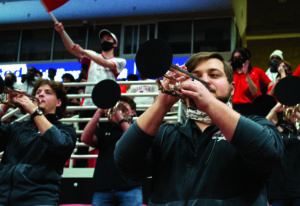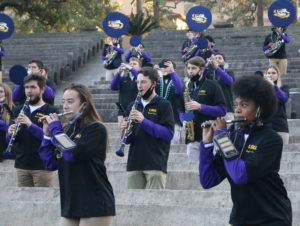Many college basketball pep bands refused to be benched during the NCAA’s 2021 season even with COVID-19 and tournament restrictions.
This year, University of Houston Cougar Brass pep band members split into in-person and virtual cohorts to play at home games and participate in virtual projects. Texas Tech University’s Court Jesters, managed to play at every home game for women’s and men’s basketball. Other groups like Auburn University brought pep to the team and fans exclusively with videos that the band filmed and shared.
While college sports teams took the court again with several precautions, the road back to live performances has been a bit more complex for bands and other pep squads, just like they were for colleges during the fall 2020 marching season.
Some basketball bands including the University of Florida, Michigan State University, University of Michigan, and University of North Carolina canceled their 2021 season entirely.
For the championship tournament, the NCAA allowed reduced attendance for the games but prohibited the presence of bands or pep squads.
Playing at Home
Some pep bands performed on their campuses for home games with the help of performance masks, bell covers, and social distancing; however, they did so in reduced numbers. In a normal year, Texas Tech’s Court Jesters have about 40 to 70 musicians; this year, the band only had 22 players, according to Dr. Joel Pagan, associate director of bands and director of athletic bands.

Texas Tech University’s indoor athletic band, the Court Jesters, managed to play at every home game for women’s and men’s basketball during the 2021 season while following COVID-19 precautions.
Before the season began, Pagan contacted students to find out everyone’s availability and willingness to play. He went through the responses he received and assigned players to certain games. Fortunately, every student had the opportunity to play in at least one game. “We were lucky enough here at Tech to be able to be allowed to come in [at 25% capacity],” Pagan says.
The first few games only had veteran players, who performed with no rehearsal. Later, non-veteran musicians participated and read the music for the first time at the performances.
University of Houston also supported their teams. Cameron Kubos, director of athletic bands and spirit groups, says that he had been planning for this season since the COVID-19 pandemic ended its 2020 season prematurely. As a result, the school was ready for many different scenarios for 2021. “We’ve … had multiple scenarios ready to go at any given time.”
Kubos gave students the option to participate in person or virtually. The band was essentially split into two groups, depending on which option they chose. Since participation in basketball band is a class required for a music degree at Houston, the choice allowed all students to fulfill that obligation without feeling pressured to play in person if a student felt unsafe.
For those who chose to play in person, the band performed at men’s and women’s home basketball games. The band did not attend rehearsals together as the students already knew the repertoire. The number of players allowed in the basketball stadium varied; at the time of the interview, the band could have up to 25 students playing while remaining distanced.
For those who chose to play only remotely, “they had a select number of online meetings and rehearsals and then participated in videos,” Kubos says.
At Purdue University, the Boiler Brass pep band had been rehearsing in person and playing spirit tunes outdoors on Fridays during passing periods. “There’s no greater support network for [the sports] program than the band students at Purdue,” says Jay Gephart, the Al G. Wright chair of Purdue bands and orchestras.
Louisiana State University (LSU) Bengal Brass rehearsed outdoors, which they have not done in the past, allowing the group to include all 70 of their pep band students. Assistant director of bands Dr. Clifton Croomes hoped to engage students on campus with “some sort of fan engagement gigs” he says.
Waiting in the Wings
While other bands weren’t active during the regular season, they had hoped to jump into action. Gonzaga University’s basketball band did not have traditional performances, but he said that the band felt ready if allowed, according to David Fague, director of the jazz studies program and the Bulldog Band.
Although the band had not had any rehearsals or shows, it would be able to draw from its existing repertoire of 42 songs “I’ve got 120 students who are dying to play,” Fague says. “They’ve been playing their instruments [in wind and jazz ensemble], and they’re ready to go.”
Virtual Pep

Louisiana State University rehearsed outdoors and transitioned to virtual performances when the SEC announced that bands would not be able to play at games during the 2021 season due to COVID-19.
In the Southeastern Conference (SEC), bands were not permitted to play at games, but some ensembles actively sought creative methods to perform. Auburn University band director Dr. Corey Spurlin asked the band members what they would like to do despite this restriction. “Creating videos for social media was one of the ideas they came back with,” Spurlin says.
After what Spurlin describes as “fairly long” outdoor rehearsals that were very taxing on students, the band had two filming sessions in the basketball stadium. Since then, the videos had been released to correspond with game days. Eventually, the marketing director of the athletic department asked Spurlin if the videos could be played in the stadium during halftime. Spurlin agreed and was glad the band could support the team and the fans, even virtually.
For the post-season, the Auburn basketball team is one of several schools that has undergone a self-imposed ban unrelated to COVID-19.
However, Spurlin says that the band is hoping to do an outdoor performance for the spring football game in April. In the meantime, making the videos ensured that band members can get credit for their pep band class.
LSU also transitioned to virtual performances when the SEC announced that bands would not be able to play at games. LSU’s band created a Mardi Gras video that combined songs from LSU sporting events with some Mardi Gras classics. The band also plans on releasing a video filmed at LSU Memorial Tower that combines LSU fight songs, school songs, and “anything you can think of that’s LSU music-related” as well as a collaboration with a DJ from LSU basketball events to “hype up the atmosphere” during March Madness, Croomes says.
In addition to basketball band videos, LSU will be filming a program consisting solely of student compositions, set to be released in early May. “I’m really excited that we’ve been able to offer students the opportunity to arrange music for our ensemble this semester,” he says.
Houston’s band has also created digital content. The band members filmed themselves playing their respective parts in “Womp Womp,” a song that is a tradition for the university. Then, the individual videos were edited together in Zoom-style squares. As Houston home games ended, the band focused on “utilizing these virtual videos,” Kubos says.
The COVID-19 pandemic has allowed some bands to innovate and find non-traditional and creative ways to showcase their musicians as well as to engage with fans both in the stadium and at home. Still, everyone is itching to return to the thrill of live performances to packed crowds as soon as it is safe to do so.
“We can’t wait to get back [to] supporting those teams and playing music and singing and dancing,” Fague says.
At Purdue, basketball game attendees have observed “what a void there is without the basketball pep bands,” Gephart says.


